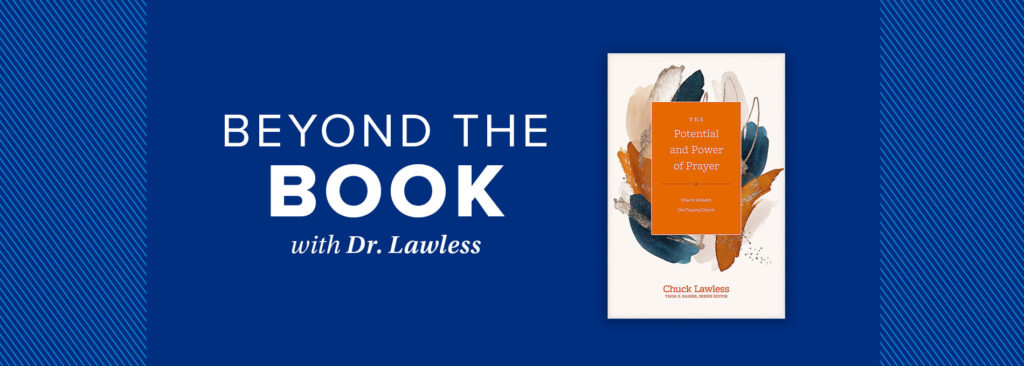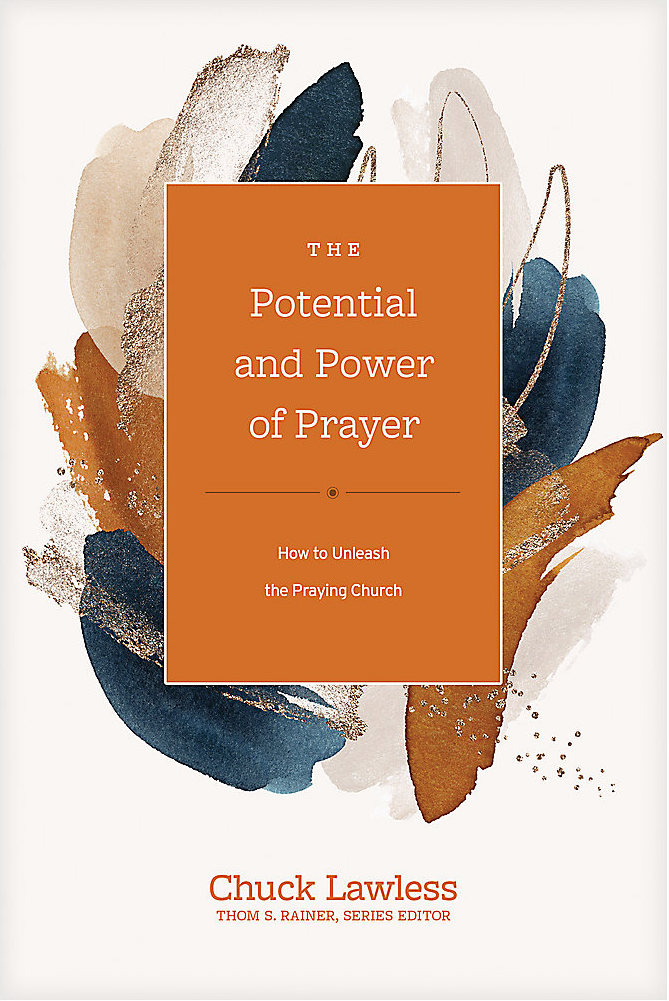Beyond the Book with Dr. Lawless: “The Potential and Power of Prayer”
Chad Burchett | August 02, 2022

We know we have been commanded to pray and even that prayer is powerful, but our own powerless prayers and the prayerlessness of our churches prove we understand and cherish prayer less than we think we do. Learn how to cultivate a lifestyle of prayer in community in “The Potential and Power of Prayer: How to Unleash the Praying Church” by Chuck Lawless, Senior Professor of Evangelism and Missions, Dean of Doctoral Studies, Vice President for Spiritual Formation and Ministry Centers, and Richard and Gina Headrick Chair of World Missions at Southeastern Baptist Theological Seminary.
Calling us to re-envision the priority and significance of prayer, Lawless surveys biblical teachings on prayer and provides practical insights and illustrations of how to pursue intimacy with God and dependence on him in prayer. In this Q&A, Lawless takes the time to answer a few questions about his new book:
What is the book about?
To put it simply, this book is about prayer. It’s about believers praying, church leaders praying, congregations praying. It is a challenge for all of us to make prayer part of our DNA.
Who is the target audience?
This book is for all believers, but I wrote it with church leaders (lay and pastoral) in mind. I am convinced that praying churches begin with praying leaders at every level of church leadership.
What motivated you to write the book?
This book is part of a series of books published through a partnership between Tyndale and Church Answers, Thom Rainer’s resource group. At the same time, I wrote this book out of a burden for the North American church. I am convinced that congregations too often go through the motions of church life without the power of God. We pray little ourselves, and we have few strategies in place to teach others to pray. I want this book to be a concise, simple resource to help address these issues.
What biblical teachings concerning prayer are most often neglected or misunderstood by the Church today?
Primarily, I think many believers see prayer only as a “go-to” resource when we have a question we cannot answer or a problem we cannot fix. It is right for us to turn to God in those situations, but prayer should be much more of a natural part of our personal relationship with God. To pray without ceasing (1 Thess 5:17) is to have prayer in our spiritual DNA. It should be an expression of our love for God and our need for him.
To pray without ceasing (1 Thess 5:17) is to have prayer in our spiritual DNA. It should be an expression of our love for God and our need for him.
What common factors contribute to powerless prayer in the Church, and what practical steps can the Church take to recover faithful prayer practices?
First, our prayers are sometimes powerless because we never actually pray them; that is, we talk about the need to pray more than we actually pray. We know the language of prayer but do not have the lifestyle of prayer.
Second, many of us who lead churches also struggle with prayer. Pastors and other church leaders set the example as prayer warriors—and I have never yet seen a strongly praying church without a strongly praying leader behind the pulpit.
Third, our prayers are generally more reactive than proactive. We pray because we are struggling to climb a mountain, not because we have a relationship with the God who moves the mountains. For example, we pray after we have tried our best and failed, after we have fallen into temptation, after we learn about problems others are facing. None of those prayers is wrong when we and others are in the battle, but we should also be praying in preparation for the battle.
Our prayers are generally more reactive than proactive. … But we should also be praying in preparation for the battle.
To begin to address these issues, we need to focus on a few lives at a time. Rather than worrying about every member growing in prayer, we should work first with leadership groups (like elders or deacons) and with other small groups (like Sunday school or life groups). If we can get a few people to grow in prayer, they can help us equip others to do the same. It may take some time to get the fire burning, but it will burn longer when even just a few believers are praying more.
How does learning to pray and leading others to pray biblically equip readers to serve the Church and fulfill the Great Commission?
Jesus gave us our marching orders in the Great Commission, but he gave us a commission we cannot accomplish in our own power. Prayer is our expression of dependence on him as we accept our responsibility to get the gospel to the nations. On the other hand, prayerlessness is a confession of self-dependence.
Prayerlessness is a confession of self-dependence.
At the same time, we support the work of missionaries when we pray regularly for them and for the people they are seeking to reach. One of our goals at Southeastern is, in fact, that all our graduates will leave with a heart for interceding on behalf of missionaries and the nations.
How has studying the potential and power of prayer shaped you spiritually?
I have written in a few places about the prayer lives of Jesus and the early Church. Every time I review those biblical texts (as I did for this book), I am even more convinced of how anemic my personal prayer life can be. I may have written the book, but I am journeying daily with others as we provoke one another to continual prayer. My prayer is that writing this resource will challenge me to pray more myself.

The Potential and Power of Prayer: How to Unleash the Praying Church
Through prayer, we have access to the all-powerful living God. Even so, too many of us are tempted to start our days prayerless and feeling alone. How can this be? We can’t afford to be so negligent, because whether we realize it or not we all face a high-stakes spiritual battle when we step out into our communities. In The Potential and Power of Prayer, Chuck Lawless
- illustrates how churches need to take prayer seriously in order to grow;
- explores how Jesus and the early church depended on God through prayer;
- explains how prayer is essential to preparing for spiritual battles; and
- guides church leaders in establishing the priority of prayer and a thriving prayer ministry in their churches.
God chooses to move among Christians who humbly come to him in prayer; who depend on him for strength and guidance.
August 8, 2022
Hardcover, 160 pages